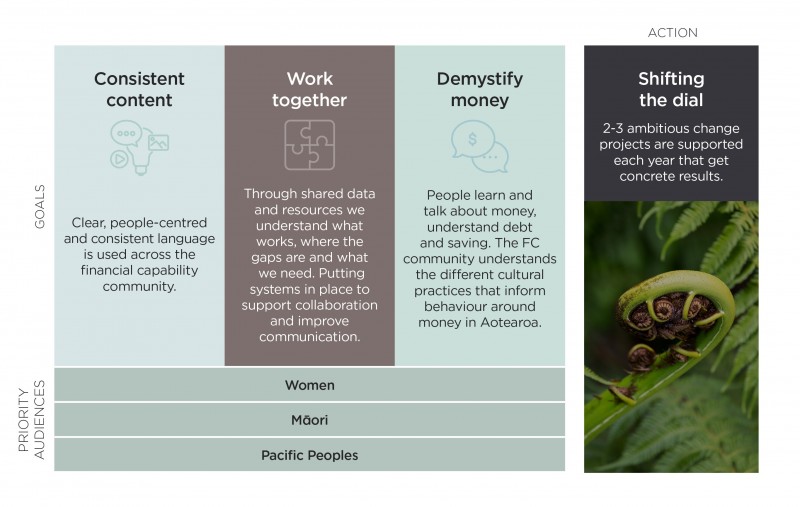He Rautaki-ā-motu mō te Āheitanga Ahumoni The National Strategy for Financial Capability
“Working together to help New Zealanders understand money”

Te Pūtake Purpose
We will better serve New Zealanders with an aligned financial capability community
Te Whakakitenga Vision
New Zealanders understand money
Te Kaupapa Mātāmua Mission
To unite the financial capability community to work together
Hei kupu whakataki Introduction
The National Strategy provides a framework for collaboration, communication and knowledge sharing across the Financial Capability community. The community includes government, industry, iwi and non-profit organisations: all working independently towards helping people to gain the skills they need to be able to achieve their goals.
This latest National Strategy has pivoted from focusing on actions New Zealanders need to take to get ahead financially, to working towards and supporting an aligned and strengthened financial capability community.
The financial capability of many New Zealanders is problematic, particularly following COVID-19. Reduced income among households across all demographics and in every part of New Zealand has led to money becoming part of the national conversation. More people are aware of their financial situation and how precarious it may be. More people have taken notice of their KiwiSaver and paid more attention to their debt and savings.
There is now an opportunity to take hold of that conversation, pool our resources and know-how, and incorporate positive messages so people learn how to make good decisions around money, how to plan, know where to find information, and become more financially capable. Now, more than ever, we can help New Zealanders make informed choices, to talk, learn, plan, save, invest and be debt-smart, and ultimately attain the retirement they deserve.
Increasingly, we understand that New Zealanders view financial capability through different cultural, social and demographic lenses. Some groups are more privileged than others and inequity is increasing. In the 21st century we have to do better.
This Strategy is designed for and by the community, drawing from each other’s experiences, and from international knowledge. We believe the Strategy will be most helpful to New Zealanders if it encourages and enables the financial capability community to work together, with a shared purpose and vision, and defined goals. It will ensure we collectively help the people we serve.
He whakarāpopototanga o te rautaki-ā-motu The Strategy in a nutshell
The path to improving the financial capability of New Zealanders is founded on the work of the organisations that help people in this space - the stakeholders who make up the financial capability community.
The Strategy provides a framework for collaboration, communication, and knowledge sharing.
The Strategy will unite the financial capability community to work around three goals, focused on three priority audiences. And we will turn ideas into action - aiming to shift the dial by starting new collaborations each year that would not be achievable alone. We want to make measurable change toward helping New Zealanders to understand money.
Ngā whainga The goals

The Strategy will unite the financial capability community to work toward three goals. These are Consistent content, Work together and Demystify money.
Consistent content
The language used to describe and discuss financial capability varies throughout the community. This leads to confusion for people using the services and information as well as for those within the community.
Language needs to be simple and accessible and should be driven by the needs of the people it serves – culture and context matter.
Language should be empowering. Creating consistent language and messages will support the work of the community.
Work together
Enabling people to work better together across the community creates new opportunities for co-operation and makes the most of our collective knowledge and resources.
The financial capability community is dispersed and siloed. Information is generally not shared and there is no uniform performance measurement.
By helping each other understand what works, we will use resources better, reduce duplication of effort, and collectively improve our effectiveness.
By encouraging collaborative, creative, and co-ordinated initiatives, the community will reach priority audiences more effectively to help them on their financial capability journeys.
Demystify money
It is vital that people understand why knowledge of debt, saving, and investing is important in making good decisions around money and reaching goals. The work of SCAFI (the Safer Credit and Financial Inclusion strategy partnership) has sparked collaboration around preventing and alleviating problem debt: there is much more to do.
The topic of money, for many, can be complicated, confusing and stressful. While some are comfortable with the accumulation of wealth as an objective, for others money needs to be framed as a means, not an end. We need to recognise motivations around providing for family, whānau and community. Demystifying money means making it understandable and relevant in different contexts so more people know the value of making good financial decisions throughout their lives.
Ngā rōpū aronga matua Priority audiences
Our research, and input from the financial capability community, has consistently highlighted three groups for whom improved financial capability would make a significant impact on their lives. These are women, Māori and Pacific Peoples. As part of activating the strategy we would like to see a focus on outcomes for these audiences. While the reasons for their situations are historic and systemic, they are also varied and contextual. Strengthening the financial capability of these groups will ripple through our whole society.
Women
- On average women’s financial literacy is significantly lower than that of men
- Women experience pay inequity in the labour market and tend to be the family members who take time out of the workforce to care for children or older relatives, meaning they arrive at retirement with less
- Women are disproportionally impacted financially by divorce and domestic violence
- Financial capability messaging is not typically designed for women
- Women bore the brunt of the COVID-19 crisis with higher rates of job loss than men
- By focusing on women’s particular needs the sector will support their financial empowerment
Māori
- Reasons for Māori inequity in financial capability are historic and complex and still impact Māori today
- Financial capability messaging has rarely been designed or delivered in culturally appropriate ways
- Gaining insight into the relationship between manaakitanga and money, between whānau and finances, and the reasons behind Māori inequity, will help everyone working in financial capability
- Te Puni Kōkiri’s Indigenous Response to Treasury’s Living Standards Framework seeks better success indicators that are whānau and strengths-based – relevant measures and approaches
- Tikanga Māori, with consideration of the principles of the Treaty of Waitangi, provides a better context for understanding the opportunities for working with and for Māori in culturally relevant and appropriate ways.
Pacific Peoples
- Raising Pacific people’s financial capability skills will help improve their economic, cultural and social wellbeing
- Despite the range of financial capability programmes that are available, Pacific people’s uptake has been low
- The Ministry of Pacific People’s Pacific Aotearoa Lalaga Fou goals seeks a different approach for Pacific people, with programmes needing to be grounded in Pacific values and culture, and holistically integrated around families and community.
- Strategy projects will focus on delivering financial capability assistance in culturally appropriate ways
Whakatāiri i te ahunga ora Shifting the dial
Through this strategy, we will actively support 2-3 projects each year, helping to identify the right partners, set appropriate project structures and systems, develop measures and monitor progress. Each one of these projects will be led by a key stakeholder organisation, and will be something that would not be possible without collaboration across the community. These projects will make a difference for New Zealanders and be focused on the priority audiences in particular.
We will keep track of the various National Strategy projects that the community undertakes and provide links and stories through this website.
This initial three-year plan shows projects that align to the goals, and who will lead them. This table will be updated regularly.
Consistent Content
2021-22Develop a sector glossary and use it sector-wide for consumer clarity |
2022-23Scope a shared resource library/collab platform |
2023-24- |
Work Together
2021-22Annual stakeholder conference to review strategy progress Online seminar series What’s happening on the ground? Align SCAFI Shared FC impact measurement framework |
2022-23Annual stakeholder conference to review strategy progress Online seminar series What’s happening on the ground? Align SCAFI Develop a practical, tailored Pacific FC plan for ongoing sector use |
2023-24Annual stakeholder conference to review strategy progress Online seminar series What’s happening on the ground? Develop a practical, tailored Māori FC plan for ongoing sector use |
Demystify Money
2021-22Industry working group to devise, fund and run a substantial pan-sector campaign or project: Money Week World Investor Week |
2022-23Industry working group to devise, fund and run a substantial pan-sector campaign or project: Money Week World Investor Week |
2023-24Industry working group to devise, fund and run a substantial pan-sector campaign or project: Money Week World Investor Week |
Te Tukanga How we got here
 In the six months during which we created this strategy, we consulted and collaborated with key stakeholders and partners across government, iwi, community and industry.
In the six months during which we created this strategy, we consulted and collaborated with key stakeholders and partners across government, iwi, community and industry.
We ran webinars, held meetings and presentations and met with industry and stakeholder groups regularly to discuss progress and invite feedback.
Our three priority audiences were identified through research, but confirmed through discussions with Te Puni Kōkiri and a number of iwi and Māori organisations working in this space, as well as with the Ministries for Pacific Peoples and Women.
We reviewed research and data relating to the financial capability and lives of New Zealanders. We reviewed international strategies and approaches and sought to understand where things were working. We consulted on the awareness, perception, and application of the previous Strategy.
This Strategy is nothing without the buy-in, involvement and commitment of the financial capability community. It is a living piece of work and we will work closely with partners as it is rolled out, pushed back on, reviewed, and re-shaped.
Governance of the strategy will be led by Te Ara Ahunga Ora Retirement Commission with the assistance of industry and sector associations and other consultation as needed. Progress will be reported to and discussed by the community at the annual conference.



